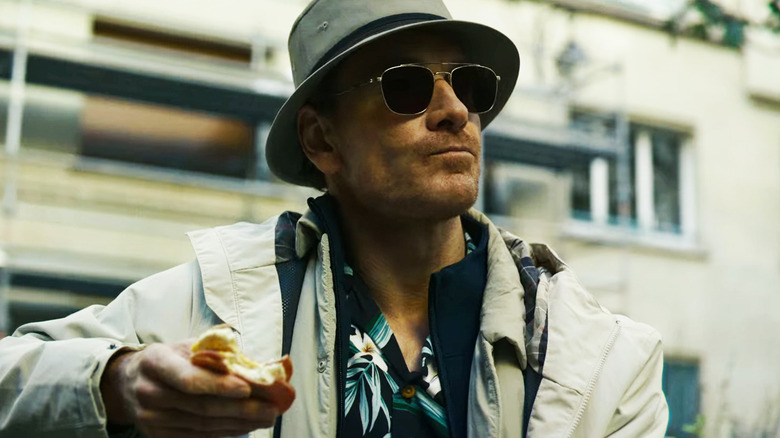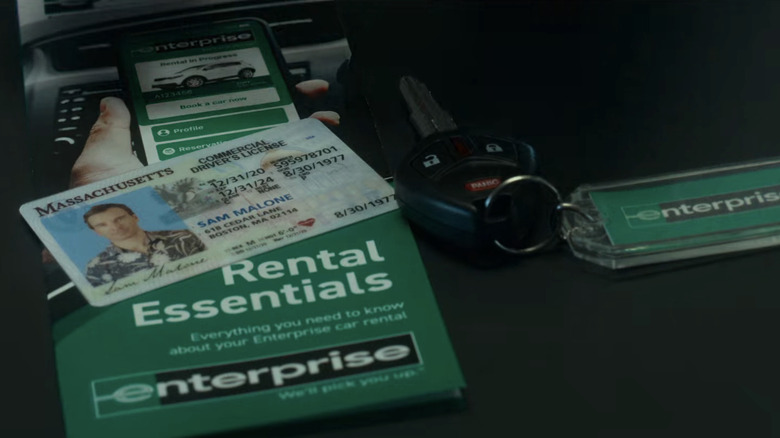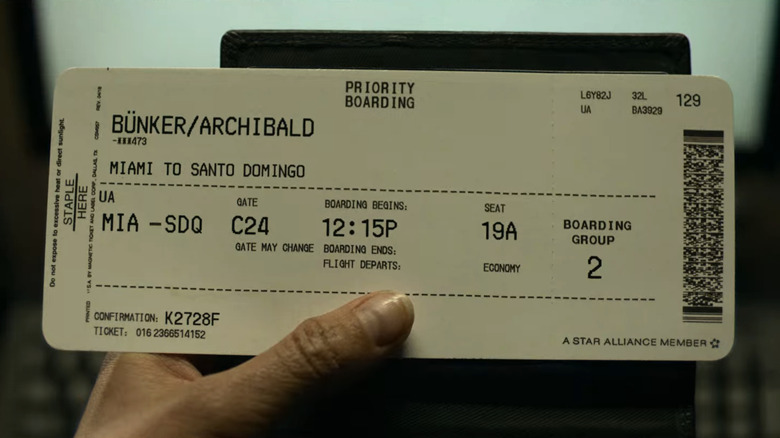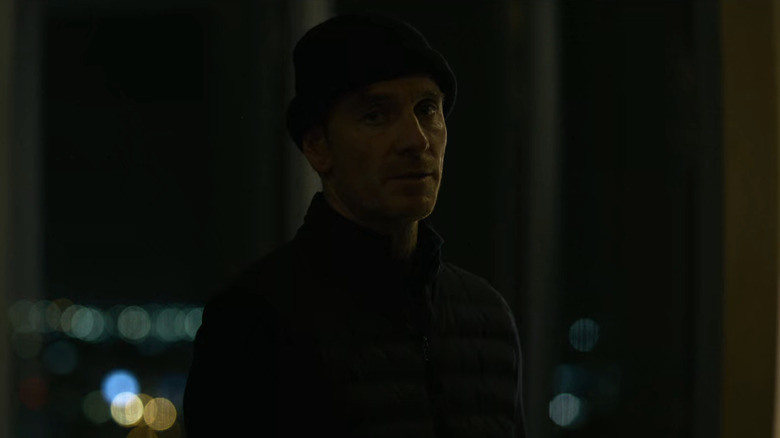Cheers' Sam Malone Wasn't The Only Sitcom Character Name Borrowed For Netflix's The Killer
Sitcoms are among some of the most beloved TV shows ever made. Unlike respected premium drama series like "The Wire," "Breaking Bad," or "True Detective," which regularly top lists of the greatest TV shows ever made, shows like "Friends," "Seinfeld," "Cheers," and "The Office" are beloved in a way that feels a lot more personal. Sitcoms are feel-good experiences, even when they're shows about nothing, and are the exact opposite of David Fincher's intense thrillers.
Which is why I can't shake the feeling that the auteur is making fun of himself with his latest effort. As /Film's Chris Evangelista wrote in his review of "The Killer," "I'm not saying Fincher is on the same level as a cold-blooded killer, but he clearly sees a lot of himself (and his approach to his work) in his latest protagonist." But if the director was trying to draw this parallel between the methodical protagonist of his latest film and his own fastidious attention to detail, he also seems to have been intent on undermining that view. Throughout the film, Michael Fassbender's assassin constantly makes mistakes, making for a darkly comedic tone that seems intent on subverting the John Wick-esque archetype of the expert killer. Or perhaps a better example would be Christian Wolff, Ben Affleck's assassin savant from "The Accountant."
"The Killer" ends with the protagonist asserting that he's not "one of the few" and actually "one of the many," seemingly confirming that he's not quite as exceptional as he initially seemed. But Fincher also makes a point of focusing on the character's many aliases to make a similar point throughout, with close-up shots of driving licenses, tickets, and credit cards featuring names taken directly from sitcom characters that are the exact opposite of Fassbender's sociopathic hitman.
A 'silly little hidden joke'
"The Killer" is the second proper collaboration between writer Andrew Kevin Walker and David Fincher, following their exploration of the limits of apathy with 1995's "Seven." Speaking to Netflix's official companion site, TUDUM, Walker explained that using sitcom names as aliases for the Killer started as an easter egg but that Fincher pushed for it to become a bigger part of the movie. As the screenwriter put it, "It's the genius of Fincher that he was like, 'OK, here's your kind of silly little hidden joke. Let's bring it forward.'"
Bringing it forward allowed Fincher to emphasize the subversive element of his movie, undermining the killer's bonafides by likening him to everyman types. Perhaps the most obvious reference is to Sam Malone, Ted Danson's bartender from "Cheers." In Beacon, NY, while tracking a fellow assassin played by Tilda Swinton, the killer hires a car with a Massachusetts license bearing the name of Danson's beloved Bostonian barkeep. In the original sitcom, which ran from 1982 to 1993, the former Boston Red Sox relief pitcher is revered by the patrons of the bar, and remains a beloved character in sitcom history — not exactly the aura Fassbender's professional murderer gives off.
There are plenty more references to lovable sitcom characters throughout. The next most recognizable name is Archie Bunker, or, as the killer's plane ticket from Miami to Santo Domingo reads, "Archibald Bünker." This is obviously a reference to the blue collar patriarch of the Bunker family, played by Carroll O'Connor in "All in the Family" and "Archie Bunker's Place." As TUDUM notes, "there's no evidence that the character's name originally bore an umlaut," but this seems like a sly gag inserted by either Walker or Fincher, giving the working class Bunker an incongruous international flair.
From Ed Asner to Matthew Perry
Not content with naming some of the most beloved figures in sitcom history, Andrew Kevin Walker and David Fincher made sure to include a deep cut in the form of Reuben Kincaid. Originating in "The Partridge Family," Kincaid was the manager of Shirley Partridge's singing group and was portrayed by Dave Madden.
Otherwise, the aliases adopted by Michael Fassbender's assassin will be fairly recognizable to anyone who grew up during the golden age of sitcoms. You won't find any "Joey Tribiani" or "Frasier Crane" here, but there is a reference to Lou Grant, the news editor played by Ed Asner in "The Mary Tyler Moore Show," whose name appears on one of the Killer's credit cards. As does the moniker "Felix Unger," a reference to the character in Neil Simon's play "The Odd Couple," who was portrayed by Tony Randall in the 1970 TV adaptation. Walker made sure to give Unger's roommate, Oscar Madison, a nod, too, with the killer also using a credit card bearing Madison's name. The character was played by Walter Matthau in the original sitcom, but was also portrayed over the years by Jack Klugman, Desmond Wilson, and most recently the late Matthew Perry.
Another reference to sitcom history comes when the killer makes his final stop in Chicago, where he makes a visit to Arliss Howard's billionaire character, Claybourne. When the assassin checks in at the gym, his name appears as Robert Hartley, the Chicago-based psychologist played by Bob Newhart on "The Bob Newhart Show," which ran from 1972 to 1978.
More than Easter eggs
"The Killer" features several other references to sitcom characters, including a boarding pass for one Howard Cunningham. This is the name of Richie Cunningham (Ron Howard)'s father in "Happy Days." The final reference is another legend of the sitcom genre: George Jefferson. Played by Sherman Hemsley in "All in the Family" and the spin-off, "The Jeffersons," George seems to be a favorite of Andrew Kevin Walker, who told TUDUM:
"The best thing that could come from this is that a lot of people flock to try to find out who some of these people were. George Jefferson, are you kidding me? He's like one of my favorite characters ever created. If this movie is kind of a window into that world, as silly as that sounds, that makes me very happy."
For David Fincher, however, these references to sitcom characters seem to be much more than a window into sitcom history. The director looks to have taken Walker's Easter egg idea and used it in service of his goal to undermine the central character's competence as a professional killer, and perhaps by extension, his own approach to filmmaking. Us film fans might like to think of Fincher as the Christian Wolff of filmmaking, making expertly judged decisions that result in perfectly executed films. But maybe he's just George Jefferson, fumbling his way through it all like the rest of us? But then, that interpretation of "The Killer" immediately undermines itself, as it seems as though Fincher is making a direct comment on any attempt to read too deeply into his films in the first place. In the end then, we're left with more questions than answers, which is why Fassbender's hitman is as interesting a David Fincher protagonist as any other.



